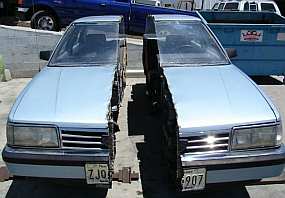Boys and girls, that’s yours truly grinning madly from the cockpit of an Aston Martin DB7 Vantage Volante. Yeah, that’s right: the car James Bond drives. All 12 cylinders of it.
As for Dan Edelen, he drives a 1993 Mazda B2600 4×4 pickup. To put this all in perspective, I’d be able to purchase a dozen of my fully-loaded $14,900 pickup new for what this lone Vantage cost new. (I’ll let y’all do the math. Yep, it’s a huge number.)
And it would be worth every dime—at least to me it would.
I’m not a car buff. Last week, a mechanic botched tightening the oil plug on my wife’s car and we lost most of the oil out of the darned thing. I had to call my neighbor over to ask him if he could help. In short, cars are akin to Chinese puzzle boxes to me.
I can talk car models…some. I can name all the manufacturers and most of the models, but that’s memory folks, not a love for cars. I hang with other guys and they start talking compression ratios and all that other stuff, and I’m lost. They’ll discuss one trick ride after another, and all I can mumble in response is “I’m crazy about Aston Martins.” Most of the time, the Mustang and Charger folks have no idea what I’m talking about.
I think the Astons possess a combination of elegance and raw power that just grabs me. The DB7 is universally considered by auto experts to be one of the most beautiful cars ever built. Pair that with the sensation of riding in a leather-seated cannonball, and perhaps you’ll understand the appeal.
Aston Martins are rare in this country. Only 19 states have a dealership. (Ohio’s is in Dublin, headquarters of Wendy’s.) Needless to say, I’ve never seen an Aston in person. I’ve been told that even at international auto shows they keep them behind glass—look but don’t touch.
My wife and I have been part of a small group for about six years. That’s where I met Tom. Now Tom’s a British car buff and drives a Lotus himself (and yes, he’s taken me for a spin in it), but I don’t think even he connected with my fascination with Aston Martin.
But this last Friday, on a picture perfect day, Tom dropped me a morning e-mail telling me to expect to see a DB7 at small group that evening.
I had to read the e-mail about five times. An Aston Martin in our fair city? Never. How would it be possible?
I spent all day Friday with goosebumps waiting…waiting.
When we pulled in that evening, there it sat, smiling at me with that gorgeous Aston grin. Solid. Confident. Refined. Flawless. Gleaming. And a Volante (convertible) to boot!
Words can’t describe how amazing this car is. It’s one of the few things I’ve ever experienced that lived up to the hype.
We all just stared at this incredible car until Tom finally said to me, “Well…?”
And we were off.
There’s something about being in a car that weighs nearly 4200 lbs with a top speed of 185 mph, 435 hp and a mind-blowing 410 ft/lbs of torque that verges on ecstacy. Tom floored it going up the entrance ramp to the major highway nearby, and I felt as if my ribcage was going to implode from the acceleration. We blew past a BMW 650i convertible and it boggled my mind that we were in a car that cost twice as much as that wickedly expensive BMW. (I think I even taunted the BMW’s driver—just a little.)
Tom and I talked (and used a normal speaking voice, even in a convertible—amazing) and he told me he’d borrowed the car from a former law partner. Ralph had only received the car a few weeks before.
Now the part about this that tore me up came when I asked Tom, “Did you do all this just for me?” He looked me in the eye, and with a big grin on his face, simply said, “Yes.” I had to glance away to the setting sun so he wouldn’t catch my eyes welling with tears.
That’s lesson one.
Of course, most of the folks at the small group wanted a ride, including my wife. With a gleaming smile, she said she needed to understand me just a little bit more, and what better way than to ride in one of those “Aston Martin cars you always talk about.” She jumped in the passenger seat and Tom came round to drive. I said to them both, “Now I’m doubly jealous.” At this Tom sauntered over to me and dangled the key. “Drive,” he said.
Now there’s something about me you all need to know. I do an excellent job of seeing all the things that could possibly go right and wrong in life. Sadly, I do a better job envisioning the wrong portion of that equation. In that second, my heart just about stopped when I pondered the possibilities: a rock tossed up by a truck cracks the windshield, my foot jams between the brake and the accelerator and it’s Audi 5000 time, or a car of joyriding teens making their way to the high school nearby gets caught up in the joyriding and misses a stop sign, WHAM, right into a British supercar that costs as much as a house. All those scenarios crashed in my brain.
It’s not my car. It’s not even Tom’s car. Our friendship would never be the same if anything happened to the DB7. I’d never live it down if something happened.
With my adrenal glands pumping out enough juice to wire an elephant, I waved him off and watched him drive away with my wife.
On walking back to the house, my heart still fluttering, I was greeted by the rest of the small group. “Tom offered to let me drive,” I said, “but I just couldn’t.” A cadre of incredulous faces greeted me. I asked, “I’m a moron, aren’t I?” “Yes” was the group consensus.
But it wasn’t right. It was too much responsibility! I have enough of a dilemma driving a friend’s car, but a friend of a friend’s? A plethora of gruesome possibilities for error and damage rose up again. Bankruptcy! Debtors’ prison! The worst possible outcome of a Dickens novel! Little Nell! Oh no, Little Nell!
How could I possibly handle it?
Did I mention this car costs as much as a nice house?
Yet I walked down to the curb and stood there, sweating. A few minutes later, they returned, and I nervously waved Tom out of the driver’s seat and hopped in. Carefully, I took my dream car, my gorgeous wife at my side, for a very short spin within the subdivision. All told, I think we drove less than a mile.
But that was enough for lesson number two.
Now what does it all mean?
I think that a lot of us don’t understand what Christ has done for us. What a friend we have in Jesus! My friend Tom heard that his former partner had just bought an Aston Martin and I’m sure he thought right away, “Dan would love this.”
God the Father looks at you, His child, and says, “Oh, you are so going to love what I have in store for you.”
Who here isn’t crying with joy? Do we know how much we are loved? The cattle on a thousand hills! The empowering of the Holy Spirit! Eternal life purchased by the blood of the One who loves us more than anything!
But some of us get handed the keys of that Kingdom and we back off. It’s too much. Too many things might go wrong! How can we handle the responsibility?
So we shrink away and miss grabbing onto that Kingdom of unrelenting joy and going to the unimaginable places the King intended us to go.
Something about me grew last Friday. Because of an amazing car. Because that car stood proxy for something priceless. More than anything, it stood for someone who loved me enough to go to extraordinary lengths to fill my life with joy. More than anything, it stood for the willingness of that someone to trust me to drive what he’d labored to secure for me.
Do you get it?
Now take the keys and drive.
(Thanks, Tom. You’re a true friend who loves at all times. Thanks Ralph, for making one dreamer’s dream come true. And to Eric for the nicely Aston Martin-ized Cerulean Sanctum banner modification.)


 I don’t think any of us can say with all certainty that we’re immune to losing some of what we hear. Let’s be honest: Can you remember three points in detail from a sermon your pastor preached three months ago? Didn’t think so. In fact, I would guess that many of you can’t even recall with absolute certainty the topic your pastor preached on just a month ago! I know that my pastor, an anointed preacher, preached on love this last Sunday, but apart from a few points about Jesus saying that loving God and loving my neighbor sums up the commandments, most of that message is a blur to me.
I don’t think any of us can say with all certainty that we’re immune to losing some of what we hear. Let’s be honest: Can you remember three points in detail from a sermon your pastor preached three months ago? Didn’t think so. In fact, I would guess that many of you can’t even recall with absolute certainty the topic your pastor preached on just a month ago! I know that my pastor, an anointed preacher, preached on love this last Sunday, but apart from a few points about Jesus saying that loving God and loving my neighbor sums up the commandments, most of that message is a blur to me. Do you sometimes feel like we’re not hearing the whole Gospel? Hang around the Godblogosphere long enough and you get the eerie feeling that no one truly knows what the whole Gospel entails.
Do you sometimes feel like we’re not hearing the whole Gospel? Hang around the Godblogosphere long enough and you get the eerie feeling that no one truly knows what the whole Gospel entails.